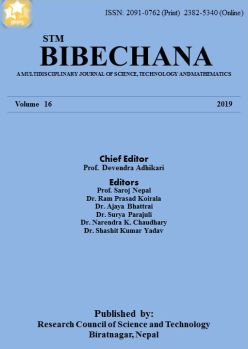Chaupadi during menstruation still a major community health challenge: perspective from Mid-Western Nepal
DOI:
https://doi.org/10.3126/bibechana.v16i0.21645Abstract
Introduction: Menstruation, a normal physiological process in reproductive life of female still has many misconceptions. Knowledge of menstrual hygiene and menstrual sanitation practices affects the health of female. Lack of awareness on menstrual care practice is a challenge for community health. Objective: The objective of this study was to find knowledge and practice on menstrual hygiene; and perspective of Chaupadi (menstrual shed) among the reproductive age group female. Methodology: A community based mixed method study having cross sectional study as quantitative domain and phenomenological study as qualitative domain was conducted in Maranthana community of Pyuthan district of mid-western Nepal from April 2016-September 2016. Using convenient sampling techniques, 109 participants were included for cross sectional study and five of them who experienced Chaupadi were enrolled for phenomenological study. One eligible participant form each household was taken after getting informed voluntary consent. Collected data was entered in Microsoft excel and analysed by SPSS and NVivo software. Results: Regarding knowledge, 73.7% were aware on the right age of menarche. Almost 93% were aware on possible pregnancy after initiation of menstruation. Many of them (34.9%) were informed on menstruation by friends. Almost half (45.9%) had negative belief of use of old clean cloth during menstrual flow. Regarding practice, only 40.4% used sanitary pad during their menstrual flow. Most (65.1%) of them did not dispose,16.5% bury in nearby ground and 18.4% burn. More than half (60.6%) used soap-water to clean genitalia. Remedial measures adopted during menstruation were taking adequate rest (44%), seeking medical advice (22.9%) and drinking plenty of fluid (13.8%). Different traditional practice followed were use of separate utensils (64.2%), not allowed to see sun (75.8%), restriction to- go outside (71.6%), cook food (56%), usual food intake (56.9%), worship (74.3%), eat with others (27.5%), sleep in usual bedroom (27.5%) and touch male members (28.4%). Most (94.5%) of them experienced Chaupadi (Menstrual Shed) during their menarche. The phenomenological approach found that Chaupadi was common. They had various infections and ill health. Mother groups were advocating to eliminate Chaupadi in their locality. Conclusion: The know-do gap on menstruation was evident. Despite increasing awareness, people were still following traditional cultural practices.
BIBECHANA 16 (2019) 228-235
Downloads
Downloads
Published
How to Cite
Issue
Section
License
This license enables reusers to distribute, remix, adapt, and build upon the material in any medium or format for noncommercial purposes only, and only so long as attribution is given to the creator.




